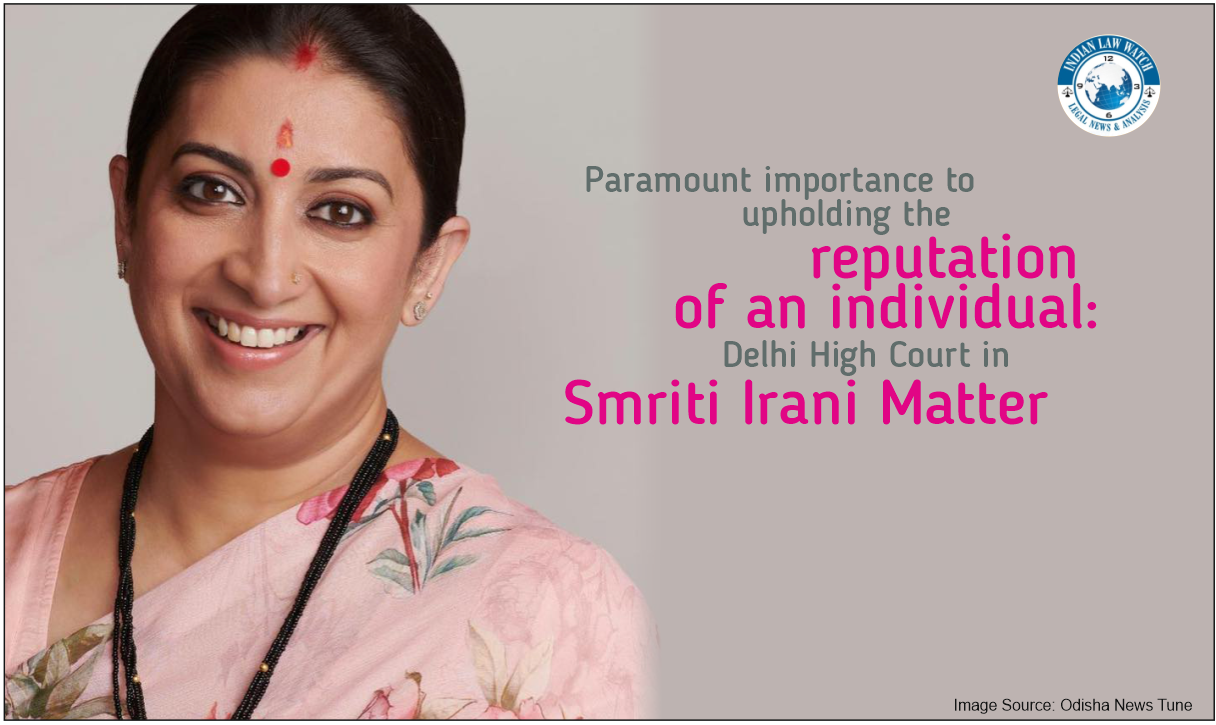

Delhi High Court in a remarkable in a judgment titled Smriti Zubin Irani vs Pawan Khera & Ors in CS(OS) 436/2022 & I.As. 11897-900/2022 pronounced as recently as on July 29, 2022 has observed quite specifically that there was no license ever issued in favour of Union Minister Smriti Irani or her daughter in connection with a restaurant named Silly Souls Cafe and Bar located in Goa. The Single Judge Bench of Hon’ble Ms Justice Mini Pushkarna made the observation while issuing summons to very prominent Congress leaders Jairam Ramesh, Pawan Khera and Netta D’Souza in civil defamation suit seeking damages of Rs 2 crores filed by Smriti for making allegations against her and her daughter pertaining to the said restaurant.

-
The Court was of the view that reputation of an individual has been placed at the highest altar and has been considered as akin to Right to Life of a citizen under Article 21 of the Constitution of India. The Court underscored that, “Thus there is imperative need to protect reputation of an individual, least to say, that of the plaintiff who is a respected member of the society and esteemed member of the Union Ministry.”
-
This matter was decided in an application on behalf of the plaintiff seeking ad-interim injunction under Order XXXIX Rules 1 & 2 read with Section 151 CPC.

- Attention of this Court has been drawn to the judgment in the case of Subramanian Swamy Vs. Union of India And Others., (2016) 7 SCC 221, wherein the Hon’ble Supreme Court has held that reputation cannot be allowed to be crucified at the altar of others right to free speech. Reference is made from following paragraphs:
“144. … We are in respectful agreement with the aforesaid enunciation of law. Reputation being an inherent component of Article 21, we do not think it should be allowed to be sullied solely because another individual can have its freedom. It is not a restriction that has an inevitable consequence which impairs circulation of thought and ideas. In fact, it is control regard being had to another person’s right to go to court and state that he has been wronged and abused. He can take recourse to a procedure recognised and accepted in law to retrieve and redeem his reputation. Therefore, the balance between the two rights needs to be struck. “Reputation” of one cannot be allowed to be crucified at the altar of the other’s right of free speech. The legislature in its wisdom has not thought it appropriate to abolish criminality of defamation in the obtaining social climate.””
- Further it may also be useful to note the other observations of the Hon’ble Supreme Court in the aforesaid judgment of Subramanian Swamy Vs. Union of India And Others, wherein it has categorically been held that protection of individual right is imperative for social stability in a body polity, and when harm is caused to an individual, the society as a whole is affected. Hon’ble Supreme Court held as follows:
“80. … The law relating to defamation protects the reputation of each individual in the perception of the public at large. It matters to an individual in the eyes of the society. Protection of individual right is imperative for social stability in a body polity and that is why the State makes laws relating to crimes. A crime affects the society. It causes harm and creates a dent in social harmony. When we talk of society, it is not an abstract idea or a thought in abstraction. There is a link and connect between individual rights and the society; and this connection gives rise to community interest at large. It is a concrete and visible phenomenon. Therefore, when harm is caused to an individual, the society as a whole is affected and the danger is perceived.””
- Umesh Kumar Vs. State of Andhra Pradesh And Another, reported as (2013) 10 SCC 591, wherein the Hon’ble Supreme Court has held as under:
“18. Allegations against any person if found to be false or made forging someone else’s signature may affect his reputation. Reputation is a sort of right to enjoy the good opinion of others and it is a personal right and an enquiry to reputation is a personal injury. Thus, scandal and defamation are injurious to reputation. Reputation has been defined in dictionary as “to have a good name; the credit, honour, or character which is derived from a favourable public opinion or esteem and character by report”. Personal rights of a human being include the right of reputation. A good reputation is an element of personal security and is protected by the Constitution equally with the right to the enjoyment of life, liberty and property. Therefore, it has been held to be a necessary element in regard to right to life of a citizen under Article 21 of the Constitution. The International Covenant on Civil and Political Rights, 1966 recognises the right to have opinions and the right to freedom of expression under Article 19 is subject to the right of reputation of others. Reputation is “not only a salt of life but the purest treasure and the most precious perfume of life”. (Vide Kiran Bedi v. Committee of Inquiry [(1989) 1 SCC 494 : AIR 1989 SC 714] , Port of Bombay v. Dilipkumar Raghavendranath Nadkarni [(1983) 1 SCC 124 : 1983 SCC (L&S) 61 : AIR 1983 SC 109] , Nilgiris Bar Assn. v. T.K. Mahalingam [(1998) 1 SCC 550 : 1998 SCC (Cri) 450] , Mehmood Nayyar Azam v. State of Chhattisgarh [(2012) 8 SCC 1 : (2012) 4 SCC (Civ) 34 : (2012) 3 SCC (Cri) 733 : (2012) 2 SCC (L&S) 449 : AIR 2012 SC 2573] , Vishwanath Agrawal v. Sarla Vishwanath Agrawal [(2012) 7 SCC 288 : (2012) 4 SCC (Civ) 224 : (2012) 3 SCC (Cri) 347 : AIR 2012 SC 2586] and Kishore Samrite v. State of U.P. [(2013) 2 SCC 398 : (2013) 2 SCC (Cri) 655] )”.”
- Perusal of the aforesaid categorically shows that reputation of an individual has been placed at the highest altar and has been considered as akin to Right to Life of a citizen under Article 21 of the Constitution of India.
- In the judgment of Ram Jethmalani Vs. Subramaniam Swamy, (2006) 87 DRJ 603, wherein this Court has held in categorical terms that a person making the statement must establish that the statement was a comment and not a fact. Reference may be made to the following observations made by this Court in the said judgment:
“90. To succeed in a plea of fair comment, the defendant must establish that the statement was a comment and not a fact. Thereafter, the defendant must establish that the comment had a sufficient factual basis (i.e. the comment must be based on facts which are themselves sufficiently true). He must additionally establish that the comment was one which an honest person could hold (this is an objective test, not to be confused with reasonableness). And finally, that the subject matter of the comment was in public interest.””
- Ajay Aggarwal Vs. Vinod Mehta & Ors., (2003) 66 DRJ 183, wherein it has been held as follows:
“15. There is room for doubt that in a democratic set up press is The Fourth Estate and it is its legitimate function to bring to the notice of the general public all that happens around and make reports specially in regard to the lapses in the administration and misconduct of public servants. While making a report about the court proceedings or judicial orders, however, the press like any other person is under an obligation to ensure that the publication is a substantially true report and is being made in good faith and for public good. Mere belief of the printer publisher that the report is correct would not be a defence unless it is shown that they had acted with due care and caution. A coloured account of judicial proceedings mixed with reporters own observations so as to create an impression as if those observations were also the observations of the Court cannot be protected by the plea of good faith as in the absence of any motive even it falls short of duty of due care and caution. In the present case, as discussed in the foregoing paras, the news item Ex. P-1, was carrying certain remarks directly attributed to the Chief Metropolitan Magistrate whereas in fact the Chief Metropolitan Magistrate had said nothing in respect thereof. The word ‘intervention’ used in para 2 of the judgment by the Court while stating the prosecution case was converted into ‘instruction’ so as to fully nail the plaintiff as a black sheep in the police force who had helped a criminal escape in a dowry death case. This reporting, therefore, was neither true nor in good faith nor in public interest. It was a totally untrue and irresponsible reporting aimed at sensationalising the issue.”





